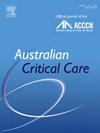Measuring comfort with the Comfort Questionnaire (CQ)-ICU in critically ill patients during intensive care unit stay: A cross-sectional study
IF 2.7
3区 医学
Q2 CRITICAL CARE MEDICINE
引用次数: 0
Abstract
Background
Stress factors have been studied in critically ill patients; however, there is a paucity of research examining the holistic aspects of comfort in this population.
Objective
The aim of this study was to identify the factors influencing the perceived comfort of critically ill patients in the intensive care unit (ICU) and their association with sociodemographic and clinical variables.
Methods
An analytical cross-sectional study was conducted with 580 patients admitted to two 1000-bed hospitals in Spain. Participants were interviewed during their ICU stay between 2015 and March 2020. Comfort was measured using the Spanish version of the Comfort Questionnaire (CQ)-ICU with seven factors: Psychological Context, Need for Information, Physical Context, Sociocultural Context, Emotional Support, Spirituality, and Environmental Context. Sociodemographic and clinical variables also collected.
Results
The comfort level was 3.18 (0.42). The mean (standard deviation [SD]) CQ-ICU score was 88.96 (11.87). The highest values (SD) were obtained in Sociocultural Context (20.21 (3.03)) and Emotional Support (10.62 (1.91)); scores (SD) were moderate in Psychological Context (16.61 (2.98)) and Spirituality (6.66 (1.93)), whereas the lowest scores (SD) were found in Need for Information (5.44 (2.23)) and Physical Context (17.33 (4.26)) and Environmental Context (12.07 (2.65)). In the logistic regression model with explained variance (62.80%), predictive variables were odds ratio [95% confidence interval]: Religion (p = 0.041) 1.54 [1.018–2.333], Numerical Rating Scale Oral (NRS-O) (p < 0.001) 2.51 [1.662–3.784], Acute Physiology and Chronic Health Evaluation II (APACHE II) (p = 0.041) 1.57 [1.019–2.433], and the number of vascular access catheters (p = 0.003), 1.79 [1.219–2.638].
Conclusion
The comfort level was high. Patients with religious beliefs or those cared for with a nurse-to-patient ratio of 1:1 were associated with higher comfort values. Sociocultural support, professionals, and spirituality were factors increasing comfort levels, whereas moderate or severe pain, lack of information, or noise requires bundles to improve comfort. The results show the importance of evaluating individual needs during ICU stay via a holistic approach using a validated instrument that also allows the measurement of the impact of interventions that prevent delirium and post-ICU syndrome. Nonetheless, studies in specific critical care units are recommended to provide further evidence.
用舒适问卷(CQ)-ICU测量重症患者在重症监护病房期间的舒适度:一项横断面研究
对危重患者的应激因素进行了研究;然而,对这一人群的整体舒适度的研究却很缺乏。目的探讨重症监护病房(ICU)危重患者感知舒适度的影响因素及其与社会人口学和临床变量的关系。方法对西班牙两家拥有1000个床位的医院收治的580例患者进行分析性横断面研究。参与者在2015年至2020年3月期间在ICU住院期间接受了采访。舒适度采用西班牙语版的舒适度问卷(CQ)-ICU,包含七个因素:心理环境、信息需求、身体环境、社会文化环境、情感支持、灵性和环境环境。还收集了社会人口学和临床变量。结果舒适度为3.18(0.42)。CQ-ICU评分均值(标准差[SD])为88.96分(11.87分)。社会文化背景(20.21(3.03))和情感支持(10.62(1.91))的SD值最高;心理情境(16.61(2.98))和精神情境(6.66(1.93))得分适中,而信息需求(5.44(2.23))、身体情境(17.33(4.26))和环境情境(12.07(2.65))得分最低。在可解释方差(62.80%)的logistic回归模型中,预测变量为比值比[95%置信区间]:宗教(p = 0.041) 1.54[1.018-2.333],口头评定量表(NRS-O) (p <;急性生理与慢性健康评估II (APACHE II) (p = 0.041) 1.57[1.019-2.433],血管导管数量(p = 0.003) 1.79[1.219-2.638]。结论患者舒适度较高。有宗教信仰的患者或护士与患者比例为1:1的患者舒适度更高。社会文化支持、专业人士和精神是提高舒适度的因素,而中度或重度疼痛、信息缺乏或噪音需要捆绑来提高舒适度。结果表明,通过使用一种经过验证的仪器,通过整体方法评估ICU住院期间个人需求的重要性,该仪器还允许测量预防谵妄和ICU后综合征的干预措施的影响。尽管如此,建议在特定的重症监护病房进行研究,以提供进一步的证据。
本文章由计算机程序翻译,如有差异,请以英文原文为准。
求助全文
约1分钟内获得全文
求助全文
来源期刊

Australian Critical Care
NURSING-NURSING
CiteScore
4.90
自引率
9.10%
发文量
148
审稿时长
>12 weeks
期刊介绍:
Australian Critical Care is the official journal of the Australian College of Critical Care Nurses (ACCCN). It is a bi-monthly peer-reviewed journal, providing clinically relevant research, reviews and articles of interest to the critical care community. Australian Critical Care publishes peer-reviewed scholarly papers that report research findings, research-based reviews, discussion papers and commentaries which are of interest to an international readership of critical care practitioners, educators, administrators and researchers. Interprofessional articles are welcomed.
 求助内容:
求助内容: 应助结果提醒方式:
应助结果提醒方式:


